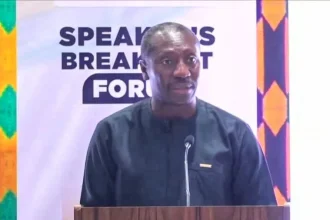The Supreme Court has turned down the NDC Flagbearer John Dramani Mahama’s request to file additional ground to its review application on interrogatories.
Counsel for the petitioner, Tsatsu Tsikata had asked the Supreme Court for “leave of time to file an additional ground of review”, that was critical to strengthen its case.
The NDC flagbearer in the 2020 elections, John Mahama, has filed a case at the Supreme Court to overturn the poll results.
At the hearing on Thursday, January 28, Mr Tsikata made reference to the fact that a supplementary statement of case could assist the court in addressing the matter before it.
But the apex court disagreed.
A supplementary statement of case (SSOC) is a document provided to amend or update the case brought before a court.
In this instance, the legal team of President Mahama wanted to provide more arguments to its already filed interrogatories review application.
A nine-member panel presided over by Chief Justice Anin Yeboah dismissed the motion on grounds that the new constitutional instrument guiding the election petition does not afford the court the laxity of time to provide additional information.
The apex court said the jurisdiction of the court cannot be invoked in the manner that counsel for the petitioner, Mr Tsikata was asking the court to do.
“We have considered the submissions canvassed for and in opposition for this application. We notice that this application before this court is brought under the inherent jurisdiction of the court to file additional grounds of review and replace paragraph 28 of the original statement of the case and to file a supplement to the statement of the case.
“The application which was argued before us, is not sanctioned by any provision in C.I. 16, specifically from rules 54 to 60 of the Supreme Court rule C.I. 16 of 1996.
“In law and by the settled practise of this court, it should be noted that review and appeals are conceptually different and the rules governing the application in either of them are very distinct and this court has in several cases exhibited remarkable consistency.
“To grant this application would be tantamount to expanding the scope of jurisdiction of review which jurisdiction is not provided under this court by the rules.
“We find that our inherent jurisdiction cannot be invoked under the circumstances of the case when the rules of the court have made clear provision in the exercise of our jurisdiction in this matter. We accordingly dismiss the application,” the CJ said.
The earlier panel included Justices; Yaw Appau, Samuel Marful-Sau, Nene Amegartcher, Prof Nii Ashie Kotey, Gertrude Torkornoo and Mariama Owusu.
The two new additions to the panel are Justice Amadu Tanko and Justice Henrieta Mensah-Bonsu.
The nine-member panel was needed to sit on the review application. The panel would revert to its original seven-team once the apex court rules on the review application.
Strong opposition from respondents
Counsel for the Electoral Commissioner Justin Amenuvor
Mr Amenuvor opposed the SSOC motion on point of law. He emphasised on the fact that the rules governing a review application are very strict and parties are to comply with the rule to ensure the election hearing is done within the stipulated 42 days.
The EC’s legal team argued that since the petitioners have acted in a way that undermined C.I. 99 of the election adjudication process, the court should not give them the needed ear.
According to him, the review jurisdiction was very strict and the nature of the review must not be allowed such frivolities.
Counsel for President Akufo-Addo, Akoto Ampaw
Adding his voice, Mr Ampaw noted that the review jurisdiction is a very special jurisdiction and because of its feature, all parties must work within the specified timeline.
In effect, the application if granted would derail the case and it’s set timeline.
It was his view that the additional ground that the applicant seeks to get does not warrant attention.
According to Mr Ampaw, the petitioner’s argument is misconceived and therefore urged the court not to entertain such.
But Mr Tsikata argued that there are precedents that show that the court allowed for a leave in respect of filing a supplement to the case.
He cited the EC voters register case which was challenged in 2020 where the apex court allowed for a supplement of case.
The review application has since been dismissed.
















